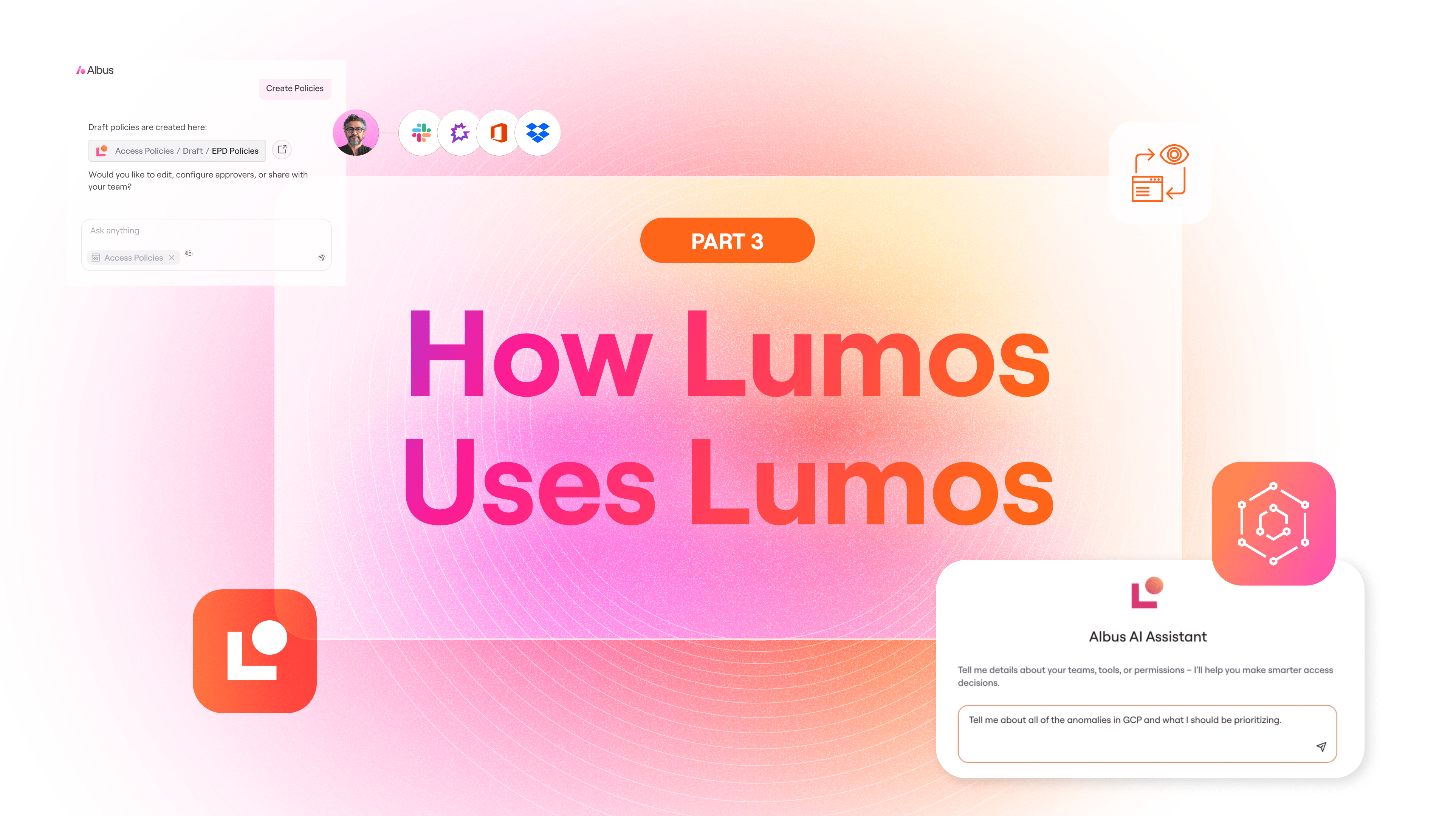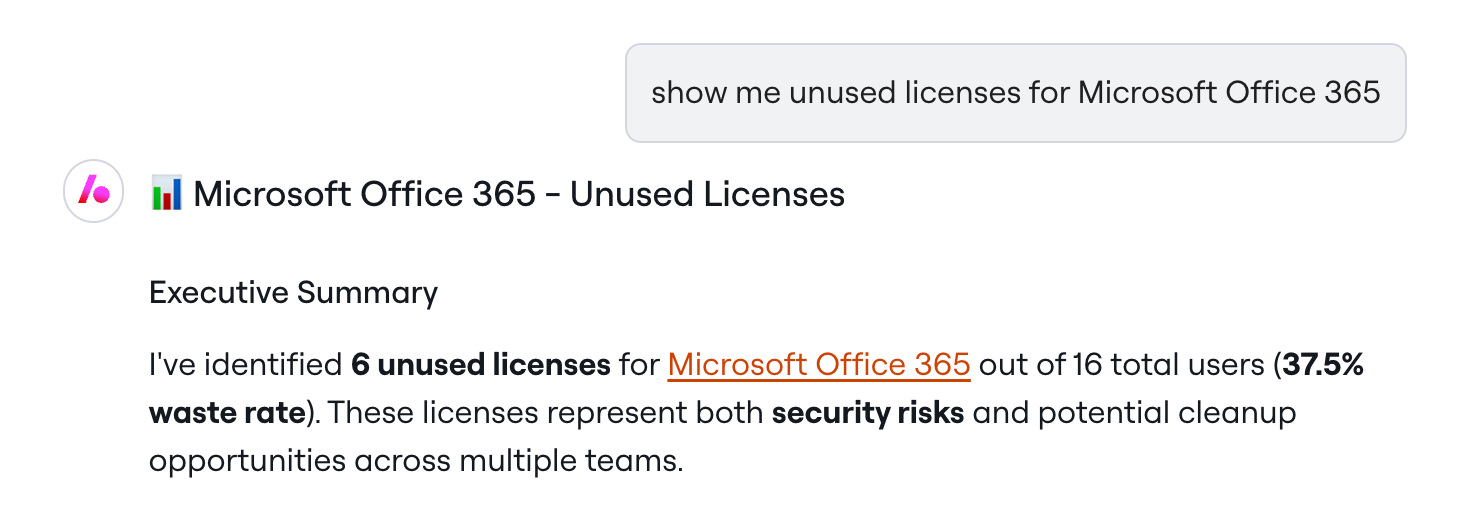
How Lumos Uses Lumos to Reduce Organizational Risk via Effective Governance
Discover how Lumos uses its own platform to automate access reviews, reduce risk, and streamline governance. Learn how AI-powered insights from Albus help our IT and security teams stay compliant, least-privileged, and audit-ready.

In this article
At most organizations, governance is something you prepare for at audit time, rather than something that runs continuously, invisibly, and automatically in the background. At Lumos, we do things differently (hello pink branding!). By using our own platform to power identity governance across the company, we’ve built a risk-aware foundation that scales with the business, not against it. Every access grant, role change, and review runs through Lumos. This helps us enforce least privilege, spot drift in real time, and eliminate manual review gaps before they become compliance issues.
This post is part of our “How Lumos Uses Lumos” series, and today, we’re focusing on governance: how Lumos helps our IT and security teams reduce organizational risk through full lifecycle access controls, AI-powered insights, and policy-driven oversight.
Be sure to check out our other posts in this series as well:
- How Lumos Uses Lumos to Scale IT via Process Automation: Onboarding, Offboarding, and Birthright Access
- How Lumos Uses Lumos to Empower End Users with Self-Service
Access Reviews Without the Chaos
Access reviews are a necessary part of maintaining least privilege, staying compliant, and reducing risk; but for most IT and security teams, they’re a time-consuming, manual burden.
Before implementing Lumos internally, we were no exception. Reviews were disjointed, tracked through JIRA tickets, and often slowed down by back-and-forth between app owners, IT, and compliance stakeholders. Today, Lumos has completely transformed how we manage user access reviews: automating the process, improving accuracy, and making audit prep effortless.
Today, we can quickly create access reviews for multiple applications, choosing when we want to launch the review and target date we want it done by. Lumos takes care of initiating access reviews on the right date and also nudges reviewers when target date approaches, supporting delegation where needed.
Lumos also lets organizations customize their definition of segregation of duties (SoD), which gets flagged as part of app reviews. As an example, if someone belongs to a group for purchasing laptops and they also belong to a group that approves laptop purchases, it could get flagged as SoD violation.
With all access reviews, comments, decisions in one place, it’s very easy to refer back to historical reviews and understand context.
From Manual JIRA Tickets to Streamlined UARs
Before Lumos, our user access reviews (UARs) relied on spreadsheets, JIRA tickets, and lots of follow-up emails. Each app owner had to manually review access lists, document their decisions, and send evidence to IT or risk teams. It was slow, fragmented, and error-prone; not to mention a major drain on bandwidth across teams.
Now, Lumos automates UARs end to end. Reviews are triggered on a set cadence, tailored to each app’s sensitivity level. App owners receive actionable reviews with access data pre-populated, usage context included, and decision prompts embedded. Comments, decisions, and justifications are all captured directly in the Lumos platform – creating a clear audit trail without extra admin work.
Best of all, Lumos helps us enforce least privilege by surfacing stale access, unused entitlements, and out-of-scope roles for immediate remediation. What used to take weeks now takes days, or even hours, with stronger results and far less friction.
Always Audit-Ready
For our Risk and Compliance team, Lumos is a game-changer. Instead of chasing down evidence or wrangling spreadsheets, they can now launch and track access reviews directly in the platform. Lumos gives them real-time visibility into review status, completion rates, and reviewer decisions – across all in-scope applications.
If an auditor asks for proof, it’s all there: timestamps, reviewer comments, access changes, and policy logic. And everything is logged and exportable in a click. This centralized control eliminates gaps, speeds up audit response, and ensures we can demonstrate compliance with SOX, SOC 2, and internal policies – without interrupting day-to-day operations.
Access reviews used to be one of the most painful parts of our compliance lifecycle. With Lumos, they’ve become just another automated process: secure, scalable, and chaos-free.
The Power of Albus: Our AI Identity Agent
At Lumos, we’re not just automating identity workflows – we’re using AI to make them smarter. Albus, our AI-powered identity agent, helps our IT and security teams go beyond task automation and into decision automation. By analyzing access patterns, usage data, and organizational structure, Albus gives us actionable insights that would be nearly impossible to surface manually. It’s become a critical part of how we manage access at scale, while continuously optimizing for security, efficiency, and business agility.
From Reactive to Proactive with AI
Albus helps us shift from reactive identity governance to proactive optimization. One of the most valuable things it does is flag our most-used apps that aren't yet behind SSO, making it easy to prioritize security hardening across our stack. This alone has helped us reduce risk by centralizing authentication and tightening controls on high-use tools.
It also surfaces unused licenses and overprovisioned accounts, giving us a clear view of where we can cut costs and improve license utilization. These insights have helped Procurement and IT work together to consolidate vendors and eliminate waste, without needing to manually pull usage reports from each app.
As an example, it’s very easy to ask Albus about Microsoft Office 365 unused licenses and we don’t just get a number, instead we get a super-detailed, action-oriented analysis including:
- Executive Summary
- Action Required
- Impact by Team
- And Actionable Recommendations and Next Steps.


Another standout capability: Albus analyzes our environment to identify which apps should be considered “birthright” (automatically provisioned based on role) versus “requestable” (available upon approval). This has allowed us to fine-tune our onboarding experience, reduce overprovisioning, and give new hires exactly what they need from day one: nothing more, nothing less.
AI-Enhanced Role Mining
Building and maintaining effective RBAC or ABAC policies is typically a tedious, high-effort process. But with Albus, role mining becomes fast, intelligent, and continuous. Albus automatically detects access patterns across departments, highlighting which users have similar entitlements and which permissions might be outliers.
This insight enables our IT and security teams to create and refine role definitions with far more precision. Instead of starting from scratch or relying on tribal knowledge, we’re guided by real usage data and AI-driven recommendations. The result: cleaner, more scalable access models, fewer edge cases, and stronger enforcement of least privilege.
Albus doesn’t just help us keep up with access governance; it helps us stay ahead. And in a world where identity is the new perimeter, that’s a game changer.
Turning Governance into a Growth Enabler with Lumos
At Lumos, we’ve proven that access reviews don’t have to be chaotic, time-consuming, or audit-fueled fire drills. By using our own platform internally, we’ve transformed user access reviews from a reactive scramble into a proactive, intelligent process that reduces organizational risk and boosts operational resilience. Whether it’s automated review cycles, embedded app owner workflows, or audit-ready reporting, Lumos helps our IT, Security, and Risk teams work smarter; not harder.
But automation alone isn’t enough. With Albus, our AI identity agent, we’ve leveled up our governance with real-time insights, smarter decisions, and continuous optimization. From role mining to identifying shadow access and refining birthright policies, Albus helps us tighten controls while improving agility. Risk doesn’t disappear – but with Lumos, it becomes visible, actionable, and manageable.
If Lumos helps us stay compliant, least-privileged, and audit-ready across hundreds of apps and identities, imagine what it can do for your organization. Ready to reduce risk and reclaim control of identity governance? Book a demo and experience access reviews without the chaos.
















